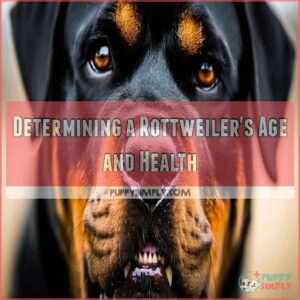This site is supported by our readers. We may earn a commission, at no cost to you, if you purchase through links.
 Your Rottweiler’s lifespan typically ranges from 8 to 10 years, though some lucky pups reach 13 with proper care.
Your Rottweiler’s lifespan typically ranges from 8 to 10 years, though some lucky pups reach 13 with proper care.
These loyal guardians pack a lot of love into their decade with you!
While their time might seem shorter than other breeds, you’ll find that Rotties make every moment count.
Your gentle giant’s longevity depends on several factors you can control: diet, exercise, and regular vet care top the list.
Genetics play their part too, but don’t let that worry you – many Rottweiler parents have discovered proven strategies to help their four-legged friends stay healthy and active well into their golden years.
Table Of Contents
- Key Takeaways
- Rottweiler Breed Overview
- Average Rottweiler Lifespan Explained
- Health Factors Impacting Rottweiler Lifespan
- Factors Contributing to a Long Rottweiler Lifespan
- Caring for a Rottweiler for Longevity
- The Life Stages of a Rottweiler
- Determining a Rottweiler’s Age and Health
- Frequently Asked Questions (FAQs)
- How long do Rottweilers live?
- How long do Rottweiler-German Shepherd mixes live?
- How long does a Rottweiler Pitbull mix live?
- How old is a Rottweiler?
- How long does a Rottweiler lab mix live?
- How big do Rottweilers get?
- Can a Rottweiler live 15 years?
- What is the most common cause of death in Rottweilers?
- Do male or female Rottweilers live longer?
- At what age do Rottweilers slow down?
- What age is considered senior for a Rottweiler?
- Can mixed Rottweilers live longer than purebred ones?
- Do indoor Rottweilers typically live longer than outdoor ones?
- How does climate affect a Rottweilers life expectancy?
- What supplements can help extend a Rottweilers lifespan?
- Conclusion
Key Takeaways
- Your Rottweiler’s lifespan typically ranges from 8 to 10 years, but with excellent care, some reach up to 12 years.
- Prioritize a balanced diet, regular exercise, and timely veterinary check-ups to boost your Rottie’s longevity.
- Genetics play a significant role, but factors like spaying/neutering and managing obesity can enhance their life expectancy.
- Regular dental care and monitoring for health issues like cancer and bloat are essential for maintaining your Rottweiler’s health, and investing in Rottweiler pet insurance can significantly reduce the cost of veterinary care for these conditions. Regular dental care and monitoring for health issues like cancer and bloat are essential for maintaining your Rottweiler’s health.
Rottweiler Breed Overview
You’ll find Rottweilers, ranking as America’s 7th most popular dog breed, are gentle giants descended from Roman Mastiffs with a natural talent for both protection and affection.
These intelligent powerhouses typically weigh between 80 to 135 pounds, making them impressive family guardians who’ll steal your heart with their confident yet loving nature.
Origin and History
Originally bred as Roman cattle-driving dogs, your Rottweiler’s ancestry is as fascinating as their loyal nature.
These powerful companions have evolved through history in remarkable ways:
- Descended from ancient Roman Mastiffs that crossed the Alps
- Found their calling in the German town of Rottweil as cattle drivers who required a balanced Rottweiler food diet
- Served as money-protecting guardians for traveling butchers
- Moved into police and military work in the early 1900s
We’re looking at a breed that’s truly stood the test of time.
Temperament and Characteristics
Behind every Rottweiler’s powerful presence lies a heart of gold.
You’ll find these intelligent dogs rank among the most trainable breeds, known for their high degree of biddability and adaptive skills for independent problem-solving, often seen in German Shepherd working intelligence. They combine loyalty with a natural guarding instinct that makes them excellent protectors.
While they might look intimidating to strangers, your Rottie will likely be a gentle giant at home – they’re known for being affectionate with family and surprisingly good with kids when properly trained.
Physical Appearance and Size
Your Rottweiler’s confident personality matches their powerful build.
These muscular dogs stand 22-27 inches tall at the shoulder, with males typically larger than females.
You’ll notice their distinctive black coat with mahogany markings, broad chest, and that famous blocky head.
Weight-wise, they’re substantial companions – females range from 80-100 pounds, while males can reach up to 135 pounds.
Average Rottweiler Lifespan Explained
Understanding a Rottweiler’s lifespan helps you make informed decisions about their care and plan for a lifetime of companionship. While most Rotties live between 8 and 10 years, some can reach up to 12 years with proper care and attention.
Here’s what you should know about Rottweiler lifespans:
- Female Rottweilers typically outlive males by about two years
- The oldest recorded Rottweiler reached 13 years of age
- Large breeds, like the English Springer Spaniel, often benefit from tailored nutrition plans, including high-quality dog food for joint health. Large breeds generally have shorter lifespans than smaller dogs
- Genetics play a significant role in determining longevity
- Regular preventive care, including monitoring for signs of dog lymphoma canine lymphoma stages, can help extend their life expectancy
Think of your Rottie’s lifespan like a journey – each year brings new experiences and challenges. By understanding what to expect, you’ll be better prepared to give your furry friend the best possible care throughout their life stages.
Health Factors Impacting Rottweiler Lifespan
Your Rottweiler’s well-being depends on several key health factors that can greatly impact their lifespan, from genetic conditions to preventable issues like obesity.
While these gentle giants face specific health challenges such as cancer and heart problems, you’ll be happy to know that many of these conditions can be managed or prevented with proper care and regular vet check-ups.
Cancer and Lymphoma Risks
Among the health challenges facing Rottweilers, cancer poses a significant concern.
Your gentle giant faces higher risks of bone cancer and lymphoma compared to other breeds.
Early detection through regular vet check-ups can make all the difference in treatment success.
Watch for symptoms like unexplained lumps, lethargy, or changes in appetite.
While genetics play a role, maintaining a healthy lifestyle helps reduce cancer risks.
Obesity and Weight Management
Weighing in at their ideal range of 80-135 pounds, Rottweilers can easily pack on extra pounds if you’re not careful with their diet.
Since they’re natural food lovers, it’s important to monitor their portions and avoid overfeeding.
Work with your vet to establish a healthy feeding schedule, choose nutrient-dense foods, and incorporate daily exercise.
Remember, those puppy-dog eyes begging for treats can be hard to resist!
Bloat and Gastric Dilatation-Volvulus
Bloat in Rottweilers isn’t just uncomfortable—it’s life-threatening.
Gastric Dilatation-Volvulus (GDV), also known as bloat, strikes when their stomach fills with gas and twists, cutting off blood flow.
Your Rottie’s deep chest makes them especially vulnerable.
Watch for restlessness, a swollen belly, and unsuccessful attempts to vomit.
If you spot these signs, don’t wait—head straight to the emergency vet.
Dental Disease and Oral Health
Your Rottweiler’s smile isn’t just for show – it’s a window into their overall health.
Just like humans, dogs can develop dental disease, which affects more than just their teeth.
Poor oral hygiene can lead to painful infections, tooth loss, and bacteria entering the bloodstream.
Regular brushing, dental chews, and yearly cleanings at the vet will help keep your Rottie’s pearly whites in top shape.
Heart Disease and Cardiac Concerns
Heart disease in Rottweilers, particularly subaortic stenosis (SAS), can greatly impact their lifespan.
This inherited heart condition affects blood flow and requires early detection through regular vet check-ups.
You’ll want to watch for signs like fatigue, coughing, or difficulty exercising.
While it’s concerning, many Rottweilers with heart conditions, especially those exposed to harsh winters, need careful consideration of their cold weather care and the importance of adjusting their diet and shelter, such as being aware of when temperatures drop below 40°F. While it’s concerning, many Rottweilers with heart conditions live fulfilling lives with proper medical care and lifestyle adjustments.
Regular monitoring makes all the difference.
Factors Contributing to a Long Rottweiler Lifespan
You’ll be happy to know that you can add years to your Rottweiler’s life through simple but powerful choices like timely spaying or neutering, regular exercise, and preventive vet care.
Your dedication to providing proper care, combined with choosing a reputable breeder who prioritizes genetic health, will give your gentle giant the best chance at a longer, healthier life.
Spaying and Neutering Benefits
Through careful timing of spaying and neutering, you can greatly boost your Rottweiler’s lifespan.
Waiting until 12-18 months old before the procedure allows for proper bone and muscle development.
Here’s what the research shows:
- Reduced cancer risk, particularly in females
- Better hormonal balance leading to calmer behavior
- Lower chance of reproductive health issues
The key is working with your vet to determine the ideal timing for your specific pup.
Regular Exercise and Physical Activity
Regular exercise keeps your Rottweiler’s body and mind in top shape.
After spaying or neutering, maintaining an active lifestyle becomes even more important.
Here’s a breakdown of activities that’ll keep your gentle giant happy and healthy:
Incorporating a balanced routine that includes both physical and mental stimulation, such as types of puppy exercise, can help prevent boredom and promote social development.
| Activity Type | Time Needed | Benefits | Intensity Level | Best Time |
|---|---|---|---|---|
| Morning Walk | 30-45 mins | Weight control | Moderate | Dawn |
| Fetch Games | 20-30 mins | Mental stimulation | High | Mid-day |
| Training | 15-20 mins | Brain workout | Low | Evening |
| Swimming | 30 mins | Joint-friendly | Moderate | Afternoon |
| Free Play | 20-30 mins | Social skills | Variable | Throughout |
Preventative Veterinary Care and Check-Ups
Along with daily belly rubs, your Rottweiler’s health starts with consistent vet visits.
Schedule wellness exams every six months to catch potential issues early.
Your vet will handle essential vaccinations, parasite prevention, and dental care screenings.
Don’t skip heartworm prevention – it’s a small investment that can add years to your pup’s life.
Think of these check-ups as your gentle giant’s routine maintenance plan.
Genetics and Responsible Breeding
A responsible breeder is like a guardian of your future Rottweiler’s health.
They’ll provide genetic testing results, health clearances from OFA or PennHIP, and complete medical histories of both parent dogs.
You’ll want to see proof of screening for common issues like hip dysplasia, heart conditions, and eye problems.
Don’t shy away from asking questions about their breeding program and reputation in the Rottweiler community.
Caring for a Rottweiler for Longevity
You’ll be amazed at how your daily care choices can add precious years to your Rottweiler’s life, from providing balanced nutrition to creating a loving, stimulating environment.
Your gentle giant’s longevity depends on a combination of proper exercise, regular vet check-ups, and the strong emotional bond you’ll build together.
Nutrition and Balanced Diet
A well-planned diet keeps your Rottweiler’s tail wagging for years to come.
Your gentle giant needs specific nutrition at every life stage, from energetic puppy to distinguished senior.
High-quality protein sources, like those found in the best dog food for rottweilers, are essential for a balanced Rottweiler diet, containing quality proteins, complex carbohydrates, healthy fats, and chelated minerals. Here’s what makes a balanced Rottweiler diet tick:
- Serve high-quality protein (25-30% for adults) to maintain those impressive muscles
- Monitor portion sizes – these food lovers can pack on pounds quickly
- Split daily meals into 2-3 servings to prevent bloat
Creating a Happy and Stimulating Environment
Your Rottweiler’s wellness goes beyond just food and exercise.
They thrive in spaces that challenge their smart minds and keep them engaged.
Set up a dedicated area with rotating toys, puzzle feeders, and safe chewing options.
Mix up their daily routine with new walking routes, training games, and socialization opportunities.
It’s like giving them a daily dose of mental vitamins – keeping their tail wagging and mind sharp.
Bonding and Preventing Separation Anxiety
Spending quality time with your Rottweiler builds a bond that helps prevent separation anxiety.
Identifying your dog’s separation anxiety thresholds is also important to address the root cause of the issue.
When you’re away, leave interactive toys and familiar scents to keep them comfortable.
Consider hiring a dog walker for midday breaks, and start crate training early – it gives them a safe space to relax.
Watch for signs like excessive barking or destructive behavior, which might indicate they’re feeling anxious when alone.
The Life Stages of a Rottweiler
You’ll find your Rottweiler growing through five distinct stages, from a tiny newborn to a confident adolescent, with each phase bringing its own set of milestones and challenges.
Just like watching your child grow up, you’ll witness your Rottie transform from a helpless pup who can’t open his eyes to an energetic teenager who thinks he knows everything.
Puppy Development (0-1 Year)
The first year of a Rottweiler puppy’s life is like watching a tiny bear cub transform into a gentle giant.
From week 3 onwards, they’ll hit major milestones: learning to walk, developing social skills, and discovering their unique personality.
You’ll need to establish a feeding schedule, start basic training, and keep up with vaccinations.
These early experiences shape your pup’s future temperament and health.
Neonatal Stage (0-2 Weeks)
Newborn Rottweiler puppies begin life completely dependent on their mother, spending most of their time nursing and sleeping.
During these first two weeks, they can’t see or hear, relying solely on their sense of smell and touch to navigate their world.
To maintain a comfortable body temperature, a puppy heating pad can be used under close supervision. You’ll notice they’re constantly seeking warmth, as they can’t regulate their body temperature yet.
Regular health checks and proper feeding schedules are essential for their survival.
Transitional Stage (2-4 Weeks)
During these pivotal weeks, your Rottweiler puppy’s world expands dramatically as they take their first wobbly steps and open their eyes to explore their surroundings.
This stage lays the foundation for their future personality and social skills.
You’ll notice their baby teeth emerging and their interest in solid food growing.
Their interactions with littermates become more playful, and they’ll start responding to sounds and movement.
Testing Stage (3-6 Months)
Your Rottweiler’s testing stage marks a vital period of rapid development and learning.
Think of it as your pup’s preschool years, where everything becomes an exciting adventure.
This period falls within the broader Socialization Period, a critical time when your puppy is shaped by their experiences.
During these months, you’ll notice:
- First permanent teeth emerging, requiring proper dental care
- Increased physical coordination and energy for structured exercise
- Critical socialization window for meeting new people and animals
- Strong vaccination needs to build immunity against parvovirus
Adolescence Stage (6-18 Months)
The adolescent Rottweiler might test your patience as they navigate their teenage months.
Like human teens, they’ll experience growth spurts and behavior changes that can make training challenging.
You’ll notice their body filling out, and their personality becoming more defined.
This stage is perfect for reinforcing socialization and establishing lasting habits that’ll shape their adult life.
Stay consistent with boundaries and rewards.
Determining a Rottweiler’s Age and Health
You’ll be amazed at how your Rottweiler’s body tells its age story through subtle changes in teeth, coat color, and eye clarity.
Just like reading your favorite book, you can learn to spot these physical signs that reveal your furry friend’s age and overall health status.
Teeth Development and Wear
Understanding your Rottweiler’s age starts with their dental timeline.
Baby teeth appear around 8 weeks, looking like tiny white pearls.
By 3-4 months, these puppy teeth give way to permanent ones.
Watch for natural wear patterns as they age – think of it like reading tree rings.
Regular dental check-ups help track these changes and catch potential issues before they become serious problems.
Coat Changes and Graying
Just as a distinguished gentleman sports silver at his temples, aging Rottweilers develop distinctive gray or white fur, typically starting around 7 years old.
You’ll notice these changes first on their chest, haunches, or muzzle – it’s like nature’s way of adding dignified highlights to their coat.
While genetics play a role in when graying begins, it’s a natural part of your Rottie’s aging journey, much like humans getting their first silver strands.
Eye Health and Vision Changes
As your Rottweiler ages, you’ll notice subtle changes in their eyes that can help gauge their life stage.
Nuclear sclerosis creates a cloudy, bluish haze in the lens around age seven.
While this might look concerning, it’s usually harmless and doesn’t greatly impact vision.
However, if you spot any sudden changes in eye appearance or behavior, it’s worth a vet check to rule out serious conditions.
Weight Distribution and Body Condition
Your Rottweiler’s body shape offers clear signs of aging.
Fat pads typically develop along their lower back as they get older, while muscle mass might start to decrease, especially around their haunches.
You can find a helpful Rottweiler weight chart to keep track of their weight distribution – a healthy adult Rottie should have a visible waist when viewed from above and ribs you can feel but not easily see.
Frequently Asked Questions (FAQs)
How long do Rottweilers live?
Rottweilers typically live between 8 to 10 years, though some can reach 12 years with proper care. Females tend to live about two years longer than males, similar to human gender longevity patterns.
How long do Rottweiler-German Shepherd mixes live?
Time flies when you’re raising a Rottweiler-German Shepherd mix!
You’ll typically get 9-13 years with your hybrid companion, though their lifespan varies based on genetics, diet, exercise, and regular veterinary care.
How long does a Rottweiler Pitbull mix live?
A well-cared-for Rottweiler Pitbull mix typically lives 10 to 13 years. You’ll notice they often inherit the robust health of both parent breeds, though genetics and lifestyle choices greatly impact their longevity.
How old is a Rottweiler?
Like chapters in a beloved book, each stage of a Rottweiler’s life unfolds uniquely.
You’ll find your furry friend maturing from puppyhood through senior years, typically living between 8 to 10 rewarding years.
How long does a Rottweiler lab mix live?
Your Rottweiler-Lab mix will typically live between 9 to 12 years, combining the Labrador’s longer lifespan with the Rottweiler’s shorter one. With proper care and genetics, they can reach their early teens.
How big do Rottweilers get?
Rottweilers can grow quite large, reaching 80 to 135 pounds and standing 22 to 27 inches tall at the shoulder.
Their impressive size, coupled with strength and loyalty, makes them both intimidating and endearing companions.
Can a Rottweiler live 15 years?
Picture a Rottweiler defying the odds to reach 15 years—it’s rare but possible.
With great genetic luck, excellent care, and lots of love, some may indeed celebrate such a remarkable milestone in their wagging journey.
What is the most common cause of death in Rottweilers?
Cancer tops the charts as the most common cause of death in Rottweilers.
Bone cancer and lymphoma are frequent culprits.
Keeping a close watch on their health can help manage these serious conditions effectively.
Do male or female Rottweilers live longer?
On average, female Rottweilers outlive their male counterparts by about two years. It’s a common trend seen in many species, including us humans!
At what age do Rottweilers slow down?
As your Rottweiler enters middle age, around 5 to 7 years, you might notice them slowing down.
They may prefer lounging over fetch, though they’ll always save their best energy for those cherished backyard adventures.
What age is considered senior for a Rottweiler?
You’ve got a senior Rottweiler on your hands around the age of
At this point, they’ll likely slow down, and it’s important to focus on healthcare and comfort to keep your furry friend feeling their best.
Can mixed Rottweilers live longer than purebred ones?
You might find mixed Rottweilers living a bit longer due to genetic diversity reducing potential health issues.
Like a lucky roll of the dice, hybrid vigor can sometimes lead to fewer inherited diseases and a slightly longer life.
Do indoor Rottweilers typically live longer than outdoor ones?
Indoor Rottweilers often live longer than outdoor ones because they’re less vulnerable to harsh weather, diseases, and potential accidents.
Indoor Rottweilers enjoy a stable environment, reducing stress and supporting their overall health.
How does climate affect a Rottweilers life expectancy?
Rottweilers thrive in moderate climates, as extreme temperatures can strain their health.
Heat may lead to heatstroke, while cold can cause joint problems.
Keeping them comfortable and safe improves their overall well-being and potentially extends their lifespan.
What supplements can help extend a Rottweilers lifespan?
Imagine the wise guru seeking longevity—omega-3 fatty acids, glucosamine, and probiotics can be your Rottweiler’s allies.
These supplements support joint health, combat inflammation, and boost digestion.
Possibly adding vibrant days to their journey.
Conclusion
Ultimately, a Rottweiler’s lifespan hinges on your dedication.
Providing proper nutrition, regular veterinary check-ups, and plenty of playtime greatly impacts their longevity.
Remember, a healthy Rottweiler is a happy Rottweiler.
Understanding the factors influencing a Rottweiler lifespan, from genetics to lifestyle choices, empowers you to give your loyal companion the best possible life.
So, cherish every moment with your furry friend; a long and healthy Rottweiler lifespan is achievable with consistent care.
Knowing the average Rottweiler lifespan helps you plan for their needs.
















